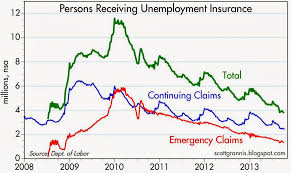Federal Reserve: Longer Unemployment Benefits Reduce Job Search Efforts
< < Go Back
According to a report from economist Maria Canon and Senior Research Associate Yang Liu of the Federal Reserve Bank of St. Louis, extending unemployment benefits reduces job search intensity.
In November 2008, Congress created the Emergency Unemployment Compensation (EUC) program, which extended the number of weeks that long-term unemployed workers could receive unemployment insurance (EI) benefits. At the end of 2013, Congress allowed the EUC program to expire.
Debate over expiration of the benefits has continued, however, with supporters of the EUC program contending that the extra benefits allow workers to continue their job searches. Those in favor of expiration, on the other hand, say that providing additional weeks of benefits only reduces job search efforts and decreases the likelihood of a worker becoming reemployed.
Canon and Liu analyzed the impact of the expiration of the EUC program by comparing the behavior of workers whose benefits were ending in 2008 (prior to the creation of the EUC program) with the behavior of workers whose benefits were ending in 2013. They also analyzed what the unemployment rates would have been had the EUC program expired earlier in 2013, finding:
– Had the EUC program expired earlier in 2013, workers would have been 1.2 to 2.1 percentage points more likely to become reemployed, increasing their search intensity and finding and accepting jobs.
– At the same time, the long-term unemployed would have been 0.4 to 0.5 percentage points more likely to leave the labor force entirely.
– In all, had EI benefits expired earlier, the likelihood of workers in the EUC program remaining unemployed would have decreased by 1.7 to 2.5 percentage points.
– Had the program expired early, the unemployment rate would have been 0.03 to 0.05 percentage points lower in late 2013 than it actually was.
Drawing from these calculations, the authors estimate that ending the EUC program at the end of 2013 may have lowered the 2014 unemployment rate slightly.
More From NCPA:




